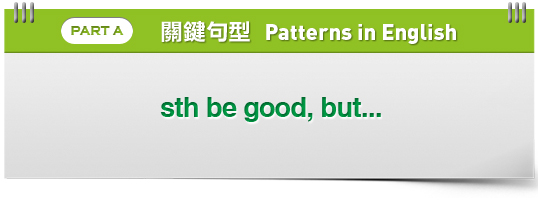| |
| |

|
|
|
 |
| |
 |
|
| |
| |
★這麼用........................... |
| |
不直接否決某事物,而以委婉的方式提出不同的意見。 |
| |
|
 |
This is good, but why are these lines so thin in this part? |
| |
這個不錯,不過為什麼這個部份的線條這麼細? |
| |
|
 |
These business cards are good, but don't you think we should make the lettering smaller? |
| |
這些名片不錯,但是你不覺得我們應該縮小字級嗎? |
| |
|
 |
This ad is good, but we think the art should be brighter. |
| |
這張廣告不錯,不過我們覺得設計應該再明亮點。 |
| |
|
 |
That was good, but you'd better speak a little more loudly when you give the speech. |
| |
表現不錯,不過你演講時應該要再大聲一點。 |
| |
|
| |
★延伸應用.......................... |
 |
These academic references are good, but you'll need one from a former employer to get into the Ph.D. program. |
| |
這些學術界的推薦函是不錯,但是你需要一份之前雇主的推薦函才能唸博士。 |
| |
|
 |
These oysters are good, but wait until you try the clams. |
| |
這些牡蠣味道不錯,但是等你嚐過蛤蜊再說。 |
| |
|
| |
★你知道嗎?......................... |
| |
通常不贊同對方意見時,可以用下列的說法開場讓語氣委婉,也比較能讓對方接受你的意見:
•This is all right, but...
•This is fine, but...
•This is satisfactory, but...
•This is suitable, but...
•This isn't bad, but...
|
| |
|
|
|
 |
|
|
|
..................................... |
|
| |
|
|
|
..................................... |
|
| |
|
|
| |
 |
|
| |
 |
|
|
|